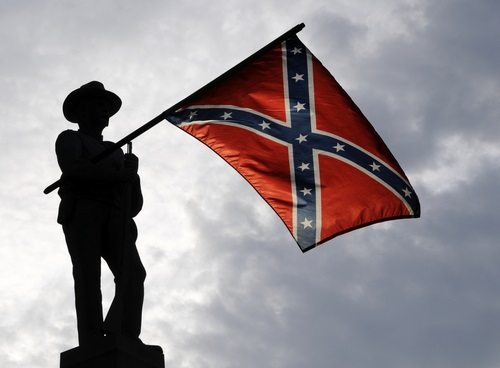
June 19, 2015; The Atlantic
Did you know that Mitt Romney in 2007 called for South Carolina to ditch the Confederate battle flag as its state flag? Back then, Romney said, “That flag, frankly, is divisive, and it shouldn’t be shown.” He did so again this past week, telling South Carolina’s Republican leadership that the time for the Stars and Bars was over. “Take down the #ConfederateFlag at the SC Capitol. To many, it is a symbol of racial hatred. Remove it now to honor #Charleston victims,” he tweeted on Saturday.
Take down the #ConfederateFlag at the SC Capitol. To many, it is a symbol of racial hatred. Remove it now to honor #Charleston victims.
— Mitt Romney (@MittRomney) June 20, 2015
Sign up for our free newsletters
Subscribe to NPQ's newsletters to have our top stories delivered directly to your inbox.
By signing up, you agree to our privacy policy and terms of use, and to receive messages from NPQ and our partners.
In the wake of the massacre of Emanuel AME Church worshippers by Dylann Roof, most of Republican presidential candidates found themselves unable to follow Romney’s lead:
- Former Arkansas governor Mike Huckabee, an ordained Baptist minister, declared the flag controversy “an issue for the people of South Carolina…not an issue for a person running for president,” and that Republican presidential candidates were being “baited” with the question.
- The two Floridians in the race, former Florida governor Jeb Bush and Senator Marco Rubio, chose to trust the wisdom of the South Carolina electorate, with Bush expressing confidence that South Carolina would “do the right thing” and Rubio saying he thought the state would “make the right choice for the people of South Carolina.” As governor, however, Bush removed the Confederate flag from the state capitol in Tallahassee.
- South Carolina’s homegrown entrant in the presidential sweepstakes, Senator Lindsey Graham, actually defended the Stars and Bars as “part of who we are.”
- Ohio governor John Kasich took a middle-ground position, indicating that the decision was up to the people of South Carolina, but if he were a resident of South Carolina, he’d favor getting rid of the flag.
- Governor Scott Walker handled the flag question the way he did the question of his attitude toward evolution—with silence (though he acknowledged that Roof’s killing spree was motivated by racism).
- One of the most interesting reactions came from former Texas governor Rick Perry, whose administration fought an effort of the Sons of Confederate Veterans to get approval of Stars and Bars Texas license plates. (Last week, the U.S. Supreme Court ruled that it was within the power of the state to reject the Confederate flag vanity plates.) Although the SCOTUS decision came after Perry was out of office, the rejection of the vanity plates was when he was in office. Although like the other states’ righters running for president, he also said the decision was up to the voters of South Carolina, he expressed a clear opinion: “The people of the state of Texas, we dealt with those issues,” in a state that is no less rock-ribbed Republican than South Carolina. At least Perry distinguished himself from Justice Samuel Alito, who defended the plates as a mechanism of free speech. Perry’s rejection of the Sons of Confederate Veterans basically amounts to a message that the organization can believe whatever it wants to believe, but the state government of Texas doesn’t have to be a party to their propagating the symbol and implicit message of the Confederate flag.
The meaning of the Confederate flag is (or, at least, should be) an issue for those nonprofits that find racist terrorism intolerable. Before the appearance of Dylann Roof in the consciousness of the American public, two members of the NAACP of Limestone County called for the removal of the Confederate flag from the county courthouse. In response, a nonprofit called Alabama Flaggers organized a rally in support of the flag, which Flagger member Freda Burton defended in this way: “This flag doesn’t hurt anybody. It doesn’t reach out and bite you in the leg or shoot anyone.”
Actually, Ms. Burton, the Confederate flag does hurt. It is a symbol of the racism that is metastasizing in American society, putting the lie to the idea that ours is a post-racial society. In Governor Perry’s Texas, the city of Beaumont and its neighbors maintain a rigid track record of racial segregation. In the town of Orange, outside of Beaumont, a group is building a Confederate Memorial museum that will have a number of Confederate flags visible from the nearby Interstate. Emblematic of the racial separation and segregation that envelops much of Beaumont, the flag is a symbol that says, like Roof did, that it is time for African Americans to go away.
If nonprofits are, in general, truly committed to eradicating racial discrimination and racial violence, their strategy will have to include eradicating public symbols such as the Confederate flag that tell blacks that they are or should be second-class citizens and encourage the likes of Dylann Roof to carry out their personal fantasies of a whites-only society.—Rick Cohen












